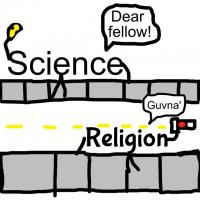Dark Money -
The Hidden History of the Billionaires Behind the Rise of the Radical Right
|
Friday, 5 January 2018
quote [ Thus, it is my intent to analyze religious thought through the lens of cognitive linguistics; to apply the research and theories of that academic discipline to the language and ideas of religion. In particular, we shall consider how image schemas and conceptual metaphors contribute to our understanding of a specific religious idea; that being, the idea that God is everything, an omnipotent mind which is spread throughout all of existence. ]
Kind of an incomplete take on things, but still an interesting read. This is an avenue I think NLP and machine learning becomes useful because we can feed all our schemas and metaphors into a system capable of extracting the structures we use and gain insight into how the brain processes information. I've got a related reading list for this floating around somewhere. ;)
|
Comments
|
midden said @ 11:48pm GMT on 10th Jan
[Score:2]
I'm feeling pretty "meh," about this article. Of course religion is just like any other human conceptual system, made up of symbols and schema that only have meaning relative to other symbols and schema, and collections of those symbols, and symbols that represent collections of symbols, etc. , and ultimately relative to fundamental qualia.
The thing that makes religion unusual, however, and a huge point that I think he completely missed, is that most religions have a (usually esoteric) tradition that very specifically says that any symbolic, linguistic, schematic labels you try to hang onto the divine reality are ultimately misleading. I always forget the word for it, but it's called apophatic theology. If you think god is like a father, you are mistaken. If you think god is like an Earth Mother, you are mistaken. If you think of god as a king, you are mistaken. If you think of god as a person, a mind, an individual, you are mistaken. If you think of life as a performance for which we are ultimately punished or rewarded, you are mistaken. The only way to get close to the reality is to let go of all the metaphorical boxes and cages we try to contain divine reality within (to use two basic schema, possessing and containing). One of the endless tragedies of humanity is that we constantly confuse the teaching for the thing being taught. |
|
0123 said[5] @ 2:00am GMT on 11th Jan
Maybe you understood the piece better than I.
The author uses the term "cognitive metaphor" dozens of times. It's the lynchpin of the "argument". The implication is that there are "non-cognitive" metaphors, and he is drawing some kind of distinction. I don't get it. We're obviously talking about ideas, the whole idea of a "cognitive" metaphor seems like jargon. |
|
steele said @ 2:10am GMT on 11th Jan
I did say it was incomplete. :D
I think the beauty of what he's talking about that you may be missing by jumping straight to the apophatic theology is that what he's talking about isn't about picking up apart the metaphors to reach that enlightenment, I don't even think he's open to that. It's simply to better understand the inner workings of our mind. BUT!!! And here's the shit that I spend far too much time obsessing over. By picking the metaphors and schemas and things apart and better understanding how those map out across all minds generically you can build a customizable, personally streamlined experience (cough VR) that would lead one to that divine reality. And actually, in my own way of picking things apart I've been building up my own ritualistic method of deconstructing myself inadvertently. Because ultimately what you internalize simply latches onto those inner workings and become a part of your process. That's why we think in whatever language we've been immersed in from birth. We're not actually thinking in a language, it's just what we're aware of, they're the fleshy bits that have grown around our inner skeleton of thought. The language of our internal narrator. The hangers-on of consciousness. That is what goes back to your apophatic theology and why one of the final steps of most enlightenment processes are an act of self-sacrifice, because that's the ultimate way of shedding those misconceptions we've used to understand our reality. #AtOneMent :D |
|
lilmookieesquire said @ 4:07am GMT on 6th Jan
[Score:1 Funny]
I came for the philosophy and I stayed for the pictures!
|
Post a comment
[note: if you are replying to a specific comment,
then click the reply link on that comment instead]You must be logged in to comment on posts.

